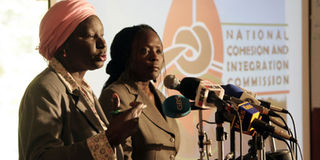Move to enable Kenyans report hate speech

National Cohesion and Integration Commission (NCIC) vice-chairperson Mary Onyango (left) and commissioner Milly Lwanga during a media brief at Safari Park Hotel, July 12, 2010. Kenyans will from this Wednesday be able to report people involved in hate speech or looming conflict through a free short text message system. Photo/JAMES NJUGUNA
Kenyans will from this Wednesday be able to report people involved in hate speech or looming conflict through a free short text message system.
Anyone could send a text to 6397 and the National Cohesion and Integration Commission (NCIC) will investigate the claims and craft a response, its vice-chair Ms Mary Onyango said on Monday.
"We don’t want to wait for crisis to occur before responding. The SMS system will enable us receive information from Kenyans telling us about potential problems brewing in their areas. Sending the message will be free of charge," Ms Onyango said.
She was speaking at a news conference at Safari Park hotel on the sidelines of a media seminar on hate speech.
Donors including USAid, UNDP and DANIDA funded the establishment of SMS system at US$ 700,000 (Sh56.7 million), Ms Millie Lwanga, an NCIC commissioner, added.
The launch follows increased incitement remarks by some politicians and tension in parts of the country ahead of the August 4 referendum.
Three MPs have since been charged in court over hate speech.
On Monday, Ms Onyango said her commission will collect information through SMS until the referendum and evaluate if the system should continue.
The idea is that the text message system can give the commission enough data to coordinate an early response that will prevent violence.
"We do not want to see a repeat of the 2005 referendum, which left us as a very divided country," Ms Onyango said.
She said she hopes that an early response, including the text message system, can lead to a peaceful August 4 vote, after which Kenyans can stay unified, regardless of whether the "Yes" or "No" side wins.
The vice-chair said the commission staff have been to potential hot spots for referendum-related violence.
"Even as we speak now, there are people on the ground," she said on Monday.
They are working with police to establish a presence in areas like the Rift Valley, where there have been several arrests over threats of evictions of some communities if they voted ‘Yes’ at the polls.
Research done by Kofi Annan led mediation team also indicated that some communities had been threatened in areas perceived to be ‘No’ strongholds.
"We have passed reports of leaflets being circulated in parts of Rift Valley to police for investigations. It is very important that we don’t act on rumours," Ms Onyango said.
She was however happy that reports of inflammatory messages by politicians during the referendum campaigns had subsided in the past three weeks.
Speaking at the media seminar, former Kenya Anti-Corruption Commission deputy director Smokin Wanjala said there was need to punish people who stir violence through hate statements.
"Violence or violent conflict is more often than not the result of utterances," Dr Wanjala said.
Dr Wanjala and African Women and Child Features Service head Rosemary Okello urged to help in enhance tolerance before and after the referendum for a stable, united Kenya.
The media should further be cautious in its messages to avoid fanning violence as happened in Rwanda in 1994.


